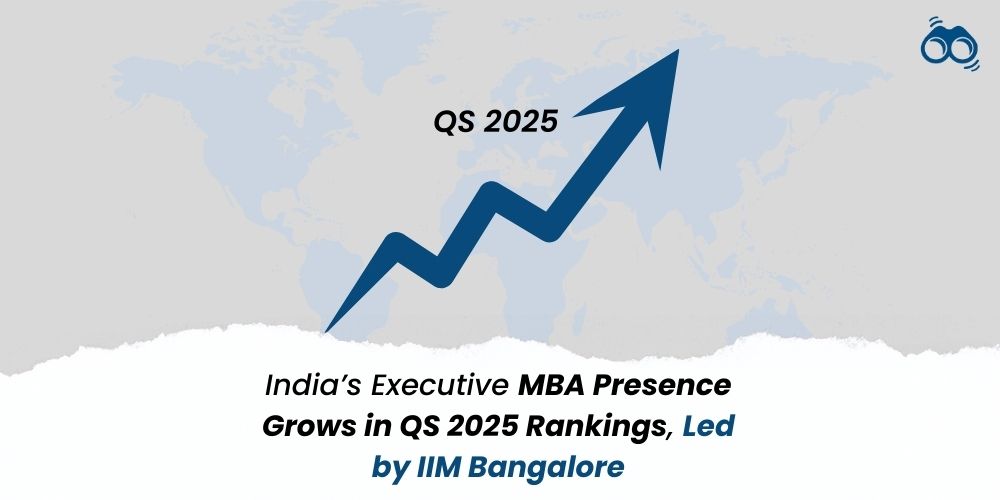QS Executive MBA Rankings 2025: What India’s Rankings Reveal About Global Competitiveness
India Expands Executive MBA Footprint with Seven Institutions in QS Rankings 2025
India continues to strengthen its foothold in global executive education, with its premier business schools earning recognition in international rankings. The QS Executive MBA Rankings 2025, released by QS Quacquarelli Symonds, evaluates institutions based on data from the QS Global Employer Survey, the QS Academic Survey, and information provided by business schools. Key indicators include executive profile, which assesses the work experience of enrolled students, and career progression, which measures salary growth and promotions within a year of graduation.
Despite dropping from 41st place last year to 50th place this year, the Indian Institute of Management (IIM) Bangalore has retained its position as the highest-ranked Indian institution in the category. Among the 233 executive MBA programmes assessed worldwide, it continues to uphold its reputation for excellence in management education.
The QS Executive MBA Rankings 2025 feature seven Indian institutions, reflecting a mix of public and private schools. Among them, three are IIMs, while four are private institutions, underscoring India's expanding executive education sector. The Indian School of Business (ISB), with campuses in Hyderabad and Mohali, ranked in the 111–120 band, making it the second-highest ranked Indian institution. Meanwhile, IIM Kozhikode secured a position in the 161–170 band, followed by IIM Indore and IMT Ghaziabad, both placed in the 181–190 band. Woxsen School of Business in Hyderabad ranked in the 191–200 band, while the Goa Institute of Management was listed in the 201+ category.
Notably, four of the seven Indian institutions witnessed a decline in rankings compared to the previous year. IIM Bangalore fell from 41st to 50th, ISB moved from the 101–110 band to 111–120, IMT Ghaziabad slipped from 171–180 to 181–190, and Woxsen dropped from 181+ to 191–200. Meanwhile, IIM Indore retained its previous rank, and IIM Kozhikode showed slight improvement, rising from the 171–180 band to 161–170. While six of these institutions featured in last year’s rankings, the Goa Institute of Management made its debut in the 2025 edition. The 2025 rankings highlight an increase in Indian representation compared to 2022 and 2023, which included only IIM Bangalore, ISB, and IIM Kozhikode. This year, seven Indian institutions secured spots, reflecting the country’s growing presence in the global executive education domain.
At the global level, Oxford’s Said Business School retained its top position for the second consecutive year, followed by HEC Paris, IESE Business School (with campuses in Barcelona and New York), MIT Sloan, and London Business School. The United States led the rankings with 68 business schools, followed by France (13), the UK (11), and Canada and Spain with nine each. Both China and India featured seven institutions in the rankings.
IIM Bangalore was the only Indian institution ranked in the global top 100, scoring 87.1 in the career outcomes category, placing it among the top 25 worldwide. However, this was slightly lower than last year's 90.8. In other indicators, IIM Bangalore received 24 in diversity, 36.8 in executive profile, and 70.4 in employer reputation, showing a slight decline from last year’s 73.9 in employer reputation. India’s consistent presence in global executive MBA rankings reinforces its growing stature in management education, highlighting both its strengths and areas for improvement.
Editor's Note:
The presence of Indian business schools in the QS Executive MBA Rankings 2025 reflects the country's growing influence in global executive education. Although IIM Bangalore remains the top-ranked Indian institution, the overall rankings show both progress and areas for improvement across the sector. With seven Indian institutions featured this year—an increase from previous editions—it is evident that executive education in India is expanding in both diversity and competitiveness. While some institutions experienced a decline in rankings, this underscores the need for continuous innovation and enhanced global engagement.
According to Skoobuzz, as India's business schools work toward strengthening employer reputation, career outcomes, and academic diversity, their evolving position in global rankings serves as a valuable benchmark for future growth and development.














0 Comments (Please Login To Continue)